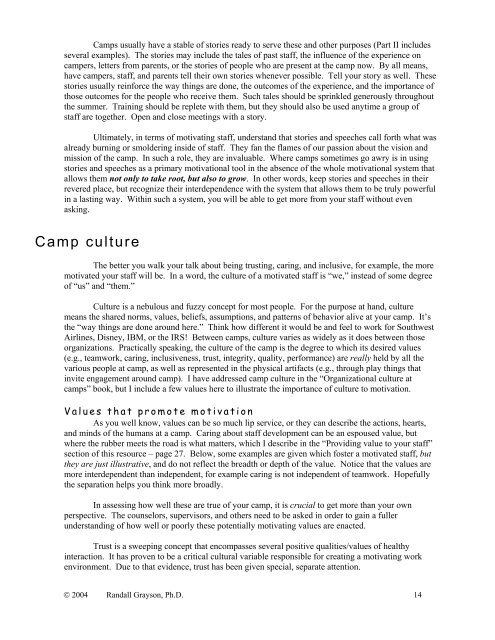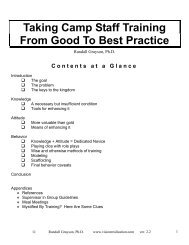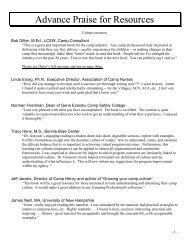Staff motivation - Vision Realization
Staff motivation - Vision Realization
Staff motivation - Vision Realization
You also want an ePaper? Increase the reach of your titles
YUMPU automatically turns print PDFs into web optimized ePapers that Google loves.
Camps usually have a stable of stories ready to serve these and other purposes (Part II includes<br />
several examples). The stories may include the tales of past staff, the influence of the experience on<br />
campers, letters from parents, or the stories of people who are present at the camp now. By all means,<br />
have campers, staff, and parents tell their own stories whenever possible. Tell your story as well. These<br />
stories usually reinforce the way things are done, the outcomes of the experience, and the importance of<br />
those outcomes for the people who receive them. Such tales should be sprinkled generously throughout<br />
the summer. Training should be replete with them, but they should also be used anytime a group of<br />
staff are together. Open and close meetings with a story.<br />
Ultimately, in terms of motivating staff, understand that stories and speeches call forth what was<br />
already burning or smoldering inside of staff. They fan the flames of our passion about the vision and<br />
mission of the camp. In such a role, they are invaluable. Where camps sometimes go awry is in using<br />
stories and speeches as a primary <strong>motivation</strong>al tool in the absence of the whole <strong>motivation</strong>al system that<br />
allows them not only to take root, but also to grow. In other words, keep stories and speeches in their<br />
revered place, but recognize their interdependence with the system that allows them to be truly powerful<br />
in a lasting way. Within such a system, you will be able to get more from your staff without even<br />
asking.<br />
Camp culture<br />
The better you walk your talk about being trusting, caring, and inclusive, for example, the more<br />
motivated your staff will be. In a word, the culture of a motivated staff is “we,” instead of some degree<br />
of “us” and “them.”<br />
Culture is a nebulous and fuzzy concept for most people. For the purpose at hand, culture<br />
means the shared norms, values, beliefs, assumptions, and patterns of behavior alive at your camp. It’s<br />
the “way things are done around here.” Think how different it would be and feel to work for Southwest<br />
Airlines, Disney, IBM, or the IRS! Between camps, culture varies as widely as it does between those<br />
organizations. Practically speaking, the culture of the camp is the degree to which its desired values<br />
(e.g., teamwork, caring, inclusiveness, trust, integrity, quality, performance) are really held by all the<br />
various people at camp, as well as represented in the physical artifacts (e.g., through play things that<br />
invite engagement around camp). I have addressed camp culture in the “Organizational culture at<br />
camps” book, but I include a few values here to illustrate the importance of culture to <strong>motivation</strong>.<br />
Values that promote <strong>motivation</strong><br />
As you well know, values can be so much lip service, or they can describe the actions, hearts,<br />
and minds of the humans at a camp. Caring about staff development can be an espoused value, but<br />
where the rubber meets the road is what matters, which I describe in the “Providing value to your staff”<br />
section of this resource – page 27. Below, some examples are given which foster a motivated staff, but<br />
they are just illustrative, and do not reflect the breadth or depth of the value. Notice that the values are<br />
more interdependent than independent, for example caring is not independent of teamwork. Hopefully<br />
the separation helps you think more broadly.<br />
In assessing how well these are true of your camp, it is crucial to get more than your own<br />
perspective. The counselors, supervisors, and others need to be asked in order to gain a fuller<br />
understanding of how well or poorly these potentially motivating values are enacted.<br />
Trust is a sweeping concept that encompasses several positive qualities/values of healthy<br />
interaction. It has proven to be a critical cultural variable responsible for creating a motivating work<br />
environment. Due to that evidence, trust has been given special, separate attention.<br />
© 2004 Randall Grayson, Ph.D. 14





